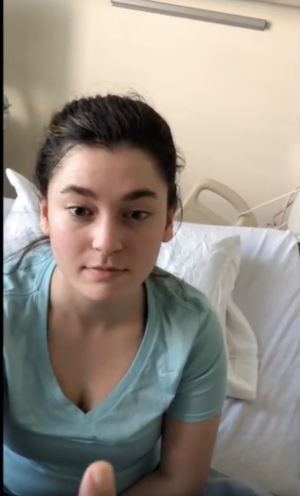
Introduction
This OSCE assesses ability to recognise and treat a serious side effect of psychotropic medications.
Student Instructions
You are about to see Jenny Smith and her parent. Jenny is a 20 year old woman who was diagnosed with schizophrenia last year.
Jenny’s antipsychotic medication dose was increased two weeks ago due to persistent hallucinations. Jenny has been otherwise well.
Jenny presents today complaining of stiffness in her neck, jaw, and tongue. Jenny tells you that her “eyes have rolled back”. She is complaining of pain and is very distressed. She has no idea what’s happening.
Task
Explain to Jenny’s parent what you think the problem is. Describe what treatment you are going to offer and how you are going to give it. Answer any other questions.
Examiner Instructions
You will be playing the role of Jenny’s mother or father in this examination as well as the assessor.
Please greet the student on entry and ensure that they sit in front of the iPad on which the video is loaded.
Inform the student that their first task is to watch the video. Press play on the video. Once the video is finished you should then inform the student that they may watch the video one more time if they need to.
Once the student is ready, please ask the following questions. Allow the student one minute per question:
- What’s causing this in Jenny?
- What can be done?
- What are the side-effects of the treatment to fix the problem?
- How does Jenny take it?
- Will this happen again? Is there anything we can do to avoid it happening again?
This station tests the following skills:
- Ability to make a rapid assessment of a dystonic reaction
- Knowledge of a specific treatment for antipsychotic side-effects (IV/ IM Benzatropine)
- Skills in reducing anxiety in a distressed parent, and giving reassurance
The candidate is not expected to:
- Take a history
- Assess symptoms of schizophrenia
- Discuss the general treatment of schizophrenia
Note that the only IM/ IV antimuscarinic is Benzatropine Mesilate (Benztropine mesylate), and can be given in a dose of 1-2mg IM/ IV. Benzatropine is more likely to cause sedation than euphoria.
You should initially appear to be upset for Jenny. But become calmer if and when the student offers reassurance, for e.g. “don’t worry, we can do something to relieve this for Jenny”.
This station tests the following skills:
- Ability to make a rapid assessment of a dystonic
- Knowledge of a specific treatment for antipsychotic side-effects (IV/ IM Benzatropine)
- Skills in reducing anxiety in a distressed patient, and giving information.
Learning Points Covered:
Evidence-Based Prescribing
- Outline the indications for use
- Recognise common side effects
- Recognise and initiate immediate management of serious side effects, including: Lithium toxicity, Valproate toxicity, Clozapine side effects, neuroleptic malignant syndrome, serotonergic syndrome, dystonic reactions, akathisia, tardive dyskinesia and tricyclic antidepressant overdose
Clinical Competencies
- Demonstrate use of patient-centred language
- Adapt interview style to patients who present with varying symptoms and levels of distress, engagement, cooperation; and who have varying educational and cultural backgrounds
- Outline key considerations when involving the patient, and where appropriate their support network, regarding psychoeducation, risk-benefit analysis and shared decision making.
- Discuss an immediate management plan for an acutely unwell patient
- Demonstrate provision of psychoeducation about recommended treatments to a patient and/or carer (e.g. through role-play or with an actual patient).
- Demonstrate a concise and competent handover for a patient to another clinician
The candidate is not expected to:
- Take a history
- Assess symptoms of schizophrenia
- Discuss the general treatment of schizophrenia
Note that the only IM/ IV antimuscarinic is Benzatropine Mesilate (Benztropine mesylate), and can be given in a dose of 1-2mg IM/ IV. Benzatropine is more likely to cause sedation that euphoria.
Actor Instructions
Examiner plays role of actor and asks the following questions:
- What’s causing this?
- What is the treatment?
- What are the side-effects of the treatment?
- How does Jenny take it?
- Will this happen again?
Additional Instructions
Nil
Assessment Guidelines
This guide is provided as an indication only.
Question 1. What’s causing this?
- Identifies that this is a dystonic reaction
- Explains in lay terms
- Indicates likely cause is increase in medication
- Provides reassurance
Question 2. What can be done?
- Indicates something can and should be done right away.
- Discusses use of Benztropine
Question 3. Side Effects of Antidote?
- Risks far outweigh potential side effects
- Likely to cause sedation, possibly euphoria
- Dry mouth and blurred vision
Question 4. Route of administration
- Indicates needs to be IM or IV for rapid effect
- Need to monitor and may need to repeat dose
Question 5. Prevent reoccurrence
- Need to review medication
- Need to monitor in a hospital, possibly need further Benztropine

